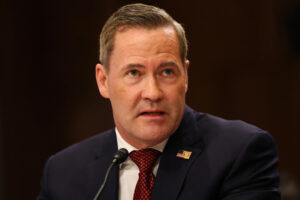Congress
Susan Collins finally got her dream job. Fellow Republicans are making it a nightmare.
To protect their majority, Senate Republicans are praying Susan Collins decides to seek a sixth term next year. But they aren’t making her life easy right now.
Earlier this month, GOP leaders pushed through President Donald Trump’s megabill while ignoring most of her concerns about safety-net cutbacks that the Maine Republican warned will be “harmful” to her state.
Now, they are barreling forward with Trump’s effort to claw back $9 billion in spending she played a key role in approving. Democrats and even some Republicans warn the maneuver could upend the bipartisan government funding process she now oversees.
Collins mounted a protest Tuesday night, joining two other Republicans in voting to block the Trump administration’s spending clawbacks. Afterward, she said in an interview her vote was in keeping with her longstanding approach to legislating.
“I vote according to what I assess to be in the best interests of my constituents and my country — and I do that regardless of who’s in control of the Senate and who is president,” Collins, 72, said.
Pressed on the recent difficulties her fellow Republicans have given her, she said, “They’re doing what they think is right. I’m doing what I think is right.”
All in all, it has been a disappointing start to the dream job Collins spent decades striving for — chair of the historically powerful Appropriations Committee — and now her power is at risk of being further eroded.
Democrats, mad as hell about the funding clawback, are threatening to withdraw from government funding talks; top Trump administration officials would love to sidestep Congress altogether on spending cuts; and there are few reasons to hope lawmakers are heading toward anything other than a spending patch — or worse, a shutdown — when the fiscal year ends on Sept. 30.
Still, Collins confirmed Tuesday she is still planning on running again, though she has yet to formally launch a campaign. She said she was “pleased” with the strong fundraising she reported this week, collecting $2.4 million in the second quarter of the year and having $5.25 million on hand as of June 30.
But Democrats are holding out hope that the deteriorating environment for bipartisanship on Capitol Hill might cause her to reconsider. More than any other personnel decision, a Collins retirement could upend the 2026 Senate map.
Democrats have a steep road back to the majority, needing to flip an unlikely four seats while also holding onto their own swing seats in Georgia and Michigan. But they view Maine as a top pick-up opportunity, and they would unquestionably have an easier time without Collins on the ballot, potentially allowing them to pour more resources into tougher races.
Sen. Thom Tillis (R-N.C.), who recently announced he would retire from his own swing seat, said Collins has a “thankless job” as chair of the Appropriations Committee but also noted the obvious political reality: Without her, Republicans would lose the seat.
“The one thing I am certain of is if Susan Collins is not running for re-election, then that state is even more at risk than North Carolina,” he said.
Maine Democrats are already mobilizing to run against Collins, linking her to the “big, beautiful bill” by calling her the “deciding vote” in the legislation coming up for debate on the Senate floor, even though she ultimately voted against it on final passage. (The vote to start debate was 51-49, so even if Collins had voted no, Vice President JD Vance would have broken the tie.)
“At the end of the day, Donald Trump and Washington Republicans know Susan Collins will have their back,” Tommy Garcia, a Maine Democratic Party spokesperson, said in a statement.
They have taken heart from recent polling showing deteriorating home-state support for Collins, including a Morning Consult survey from April that found 51 percent of Maine voters disapproving of her performance. Separately, 71 percent of respondents to a University of New Hampshire April poll in Maine said that Collins did not deserve to be re-elected, including a majority of Republican respondents.
But Collins, the only Senate Republican from a state won by Kamala Harris, is helped by an obvious rule of political life: You can’t beat somebody with nobody, and so far Democrats have struggled to recruit a big name to challenge her. Senate Minority Leader Chuck Schumer and other party leaders are still making overtures to Gov. Janet Mills, who has largely left the field frozen while the party awaits her final decision.
There’s also little expectation Collins would flinch from the political challenge. Her Senate career was all but written off by many political observers in 2020, when polls showed her constantly trailing Democratic rival Sara Gideon. She went on to win by roughly 9 points.
Many in the GOP share Tillis’ view that Collins is about the only Republican who can win a Senate seat in Maine, and she has gotten a wide berth to break with her party because of that. Trump hasn’t lashed out at Collins for opposing the megabill — unlike with Tillis and Kentucky Sen. Rand Paul.
“Everybody cuts her a lot of slack,” Senate Majority Leader John Thune said on Tuesday night. “She represents … a very blue state. She has to run for reelection this year. She’s the only Republican that can win. And so, you know, she sees the world through a different lens, and she’s always very upfront about what she’s going to do.”
GOP colleagues, he added, “are encouraging her and urging her, doing everything we can to help her to make sure she runs. … She’s got a different calculus, probably than some do in our conference. But there is nobody in our conference who represents a state like hers.”
Democrats’ bet is that Collins concludes that spending another six years in a legislative body whose governing norms have eroded — and a party whose principles she is increasingly out of step with — simply isn’t worth it.
One fellow GOP senator, granted anonymity to speak candidly, said Trump isn’t happy with Collins and might not keep quiet indefinitely.
“He’s very irritated at Susan — very, I can tell,” the GOP senator said of Trump. “But she doesn’t care, because the more Trump gets irritated with her, the better it is for her politics back home.”
Collins “is in an awkward spot” and “gets a pass on a lot of the things that she has to do,” the senator said. But nobody believes Collins’ happy talk about getting government funding back on track, the GOP lawmaker added.
Thune, for his part, said it is his “intention” to “see if there’s a path forward to doing appropriation bills around here.”
“I know Senator Collins … is very interested in a normal appropriations process, and I’m hopeful we can get that back on track,” he said.
But with a 53-seat majority, Senate GOP leaders have already shown their willingness to sidestep Collins. Early in the megabill negotiations she detailed to White House officials, including chief of staff Susie Wiles, what changes she would need to vote for the bill, but leaders didn’t bend the legislation in her direction — and didn’t need to. As with the Trump spending clawback, they calculated they could afford to lose Collins and Sen. Lisa Murkowski (R-Alaska), her close ally and friend, by catering to holdouts on the right.
Collins and Murkowski opposed proceeding with the rescissions package Tuesday, emerging unmoved from a last-ditch lunch pitch from White House budget director Russ Vought, who has sought to placate Collins along with other administration officials. Sen. Mitch McConnell of Kentucky, the former GOP leader, joined them in opposition.
Republicans acknowledge privately that any turbulence in the appropriations process doesn’t help Collins, who has made her gavel and seniority a key part of her home-state image. Just last week, GOP senators had to hit pause on one of the 12 annual funding bills because of a partisan fight over the Trump administration’s plans to relocate FBI headquarters — the sort of dispute the typically bipartisan Appropriations Committee usually expertly resolves.
But they remain confident she’s running and can win despite forcing her to run against large parts of her own party’s agenda. She recently held a campaign event at the National Republican Senatorial Committee, according to one colleague who attended, who described it as a “lobster roll event.”
Sen. Kevin Cramer (R-N.D.) said he wasn’t worried about Collins, calling her “the greatest politician.”
“She wins by as large a margin as a lot of people in red states,” he said. “She knows her state. She knows how to navigate. I don’t worry about it.”
Calen Razor contributed to this report.
Congress
Oz to huddle with House tax writers
Democrats and Republicans on the House Ways and Means Committee are set to have a bipartisan meeting next Wednesday with Mehmet Oz, President Donald Trump’s administrator for the Centers for Medicare & Medicaid Services, as congressional tax writers eye year-end health care legislation following their work in helping craft the “big, beautiful bill.”
According to a notice of the meeting viewed by Blue Light News, Ways and Means members are invited “to discuss the priorities” of CMS on July 23, including issues “involving health care matters” that fall within the jurisdiction of the panel.
Conversation could turn to what’s next for Ways and Means and its counterpart in the Senate, the Finance Committee, where Republicans are actively discussing interest in moving an overhaul to the operations of pharmaceutical benefit managers, the intermediaries who negotiate drug prices between pharmacies and manufacturers.
Discussion next week could also focus on the critical role Oz played in reassuring Senate Republicans that hospitals in their states could tap into a rural hospital relief fund amid steep cuts to Medicaid in the GOP megabill.
Congress
Zohran Mamdani briefs House Democrats on lessons from his campaign
Zohran Mamdani, the polarizing Democratic nominee for New York City mayor, huddled privately Wednesday with Democratic lawmakers at a Washington restaurant. The conversation, attendees said, focused on campaign strategy and lessons learned from his surprise win.
Those included “the effective communications strategy that they employed, very dynamic and natural,” said Rep. Chuy Garcia (D-Ill.). “And it allowed him to project who he is and his vision for New York.” Rep. Alexandria Ocasio-Cortez (D-N.Y.) organized the event, which was billed as a “communication and organizing skill share” breakfast.
Ocasio-Cortez and Mamdani both left the roughly two-hour meeting without appearing or speaking with reporters. A Mamdani spokesperson didn’t immediately respond to a request for comment.
As Democrats search for a winning message and campaign strategy heading into the 2026 midterms, some in the party have pointed to Mamdani’s campaign and its social media virality as evidence they need to focus more on cost-of-living issues than other hot-button culture war issues.
Attendees were largely from the left flank of the party; centrists have publicly and privately expressed concern about Mamdani, who identifies as a Democratic Socialist, being a liability for the party nationally. Hakeem Jeffries, the top House Democratic leader and a fellow New Yorker, has so far withheld an endorsement pending a meeting with Mamdani.
Rep. Laura Gillen (D-N.Y.), who represents a purple Long Island district, has gone so far as to brand Mamdani as “too extreme” to lead the city. But those leaving the meeting spoke positively about him and his campaign.
“There is no debating that the campaign that he ran was a successful one. His economic message, his ability to cut through and just speak to people’s pain points in New York City,” said Rep. Lori Trahan (D-Mass.). “And then how he did it, right, the videos, the media, the volunteers, the organizing. … We talked about the lessons from that campaign and how it can really impact the way we speak to voters.”
“The party can learn a lot from him and AOC about digital communication and organizing,” added Rep. Ro Khanna (D-Calif.).
Congress
Trio of crypto bills back on track, Scalise says
House Majority Leader Steve Scalise said he expects votes on all three cryptocurrency bills that Republicans are pushing to go to the House floor Wednesday, though leadership is still weighing how to sequence or combine them.
“We’re bringing all of them,” Scalise said in a brief interview. “We’re back on track. And exactly what the combination will be, we’re talking through that, but all three bills will be encompassed in the work we do today.”
The slate of crypto bills includes a sweeping market structure measure known as the CLARITY Act, Senate-passed stablecoin legislation called the GENIUS Act and a third measure to ban a central bank digital currency.
“They’re all going to pass,” House Majority Whip Tom Emmer (R-Minn.) told reporters entering the speaker’s office Wednesday morning. How they pass, though, remains an open question.
GOP leaders could seek to merge the CBDC ban into the CLARITY Act in order to appease conservative hard-liners who brought down a key procedural vote Tuesday. The holdouts say they secured a promise from Trump to add CBDC language into CLARITY, but GOP leaders have balked at directly linking the two.
The market structure bill has bipartisan support, but most Democrats oppose banning a CBDC, which is a government-issued digital dollar that conservatives say would open the door to privacy invasions.
A senior Republican granted anonymity to describe private scheduling conversations said if the sequencing isn’t figured out today, the entire slate of bills could get pushed into next week.
-

 The Josh Fourrier Show8 months ago
The Josh Fourrier Show8 months agoDOOMSDAY: Trump won, now what?
-
Uncategorized8 months ago
Bob Good to step down as Freedom Caucus chair this week
-

 Politics8 months ago
Politics8 months agoWhat 7 political experts will be watching at Tuesday’s debate
-

 Politics8 months ago
Politics8 months agoHow Republicans could foil Harris’ Supreme Court plans if she’s elected
-
Economy8 months ago
Fed moves to protect weakening job market with bold rate cut
-
Economy8 months ago
It’s still the economy: What TV ads tell us about each campaign’s closing message
-

 Politics8 months ago
Politics8 months agoRFK Jr.’s bid to take himself off swing state ballots may scramble mail-in voting
-
Uncategorized8 months ago
Johnson plans to bring House GOP short-term spending measure to House floor Wednesday







